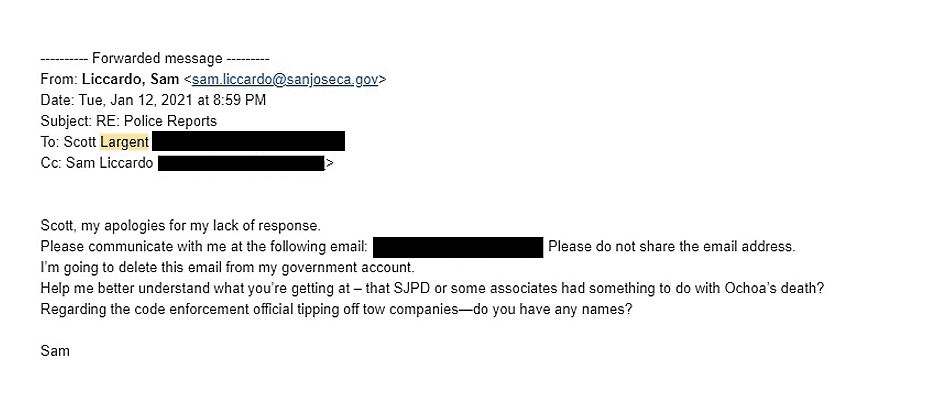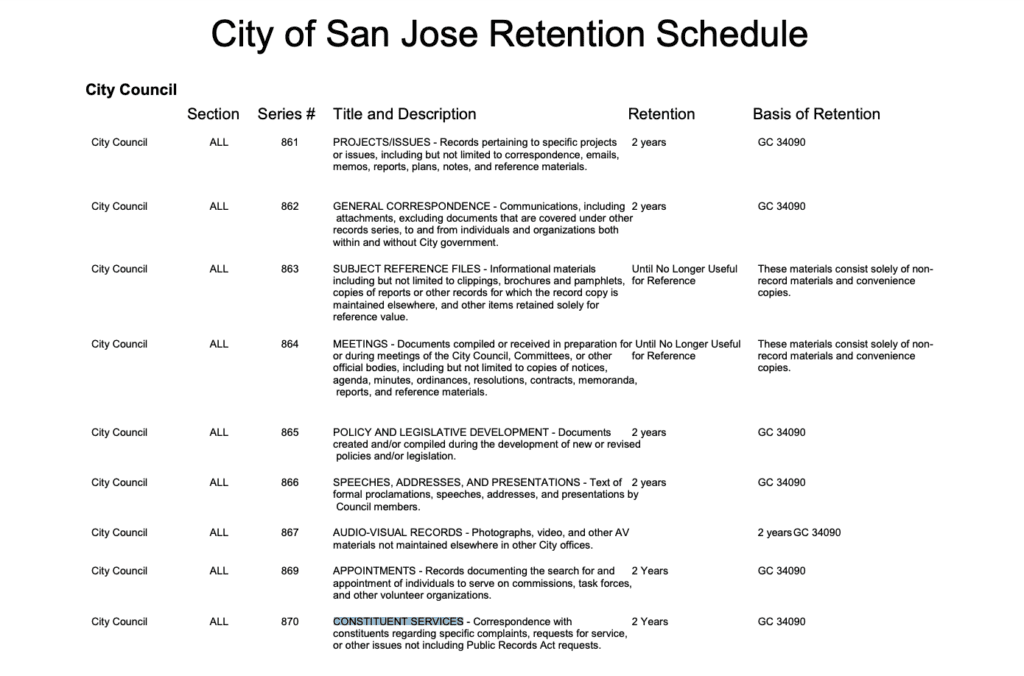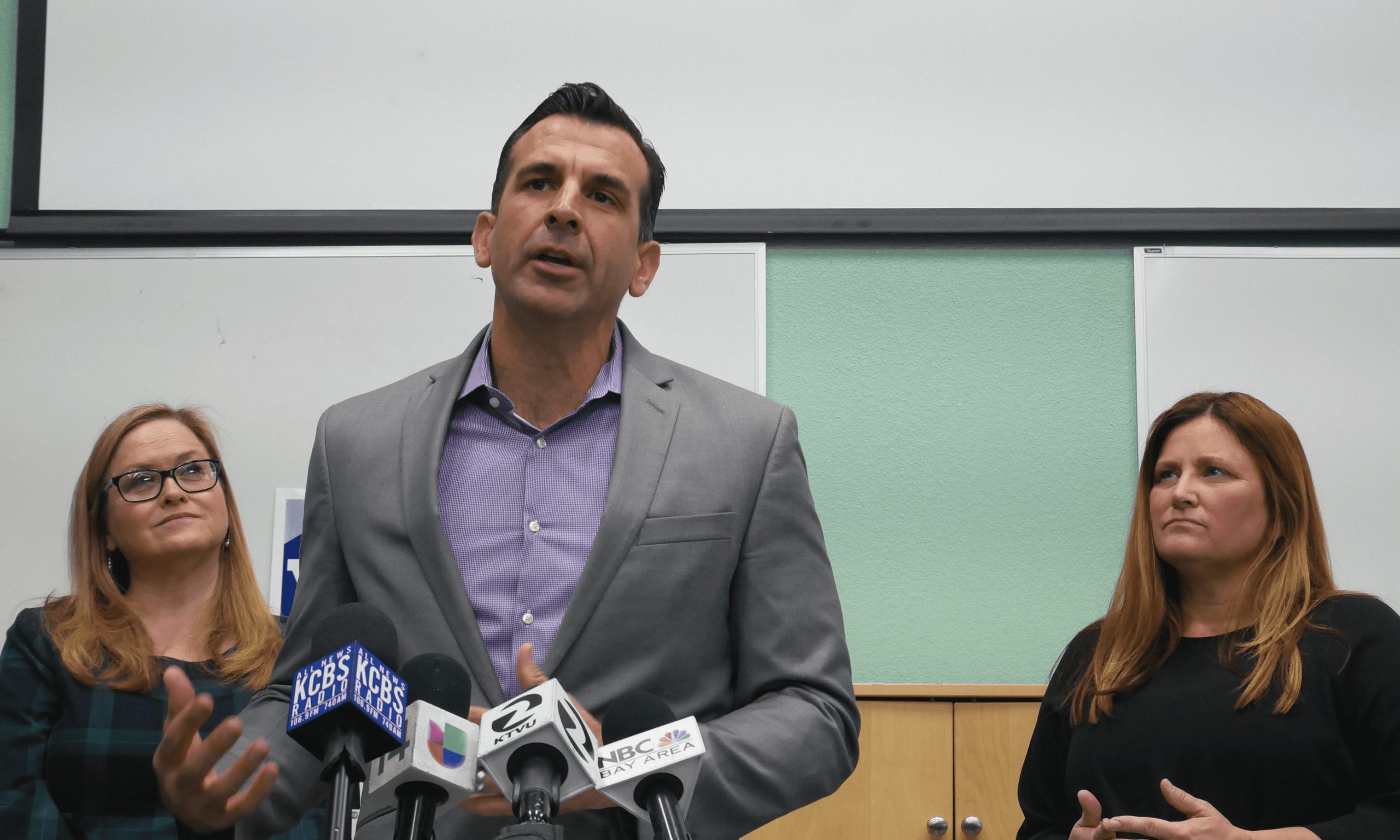San Jose Mayor Sam Liccardo appears to have skirted public records laws by directing a resident to contact him on his private Gmail and deleting their correspondence from his public government account.
The email thread, obtained by San José Spotlight, shows the mayor promising to delete the conversation from his official email. None of the messages in question—which dealt with public business—were turned over in a public records request. This means Liccardo effectively avoided their public disclosure by using his private account and deleting the thread.
It all started when longtime homeless advocate Scott Largent spoke at a committee meeting chaired by Liccardo on Nov. 18, 2020. Largent, often a government watchdog, told Liccardo that he had a file of information on John Tompkins, a former San Jose police officer who was arrested on narcotics and firearms-related charges in 2019.
“I would like to provide this to you, Mayor Liccardo,” Largent said at the meeting.
The mayor asked Largent to email the information to his public San Jose government account.
Largent contacted the mayor the next day, sharing details about Tompkins, as well as claims of corruption in the city’s code enforcement division. Citing safety concerns, Largent told the mayor he was worried his emails might be accessible via a public records request and asked whether there was a better way to communicate with Liccardo.
Without hesitation, the mayor offered his personal email account—and said he would delete the emails from the public server.
“Please communicate with me at the following email: s***********@gmail.com. Please do not share the email address. I’m going to delete this email from my government account,” Liccardo wrote, also copying his private email.
Liccardo and Largent continued to communicate about the police corruption, emails show, with the mayor responding with his private email.


The city said it could not find those emails. Once the mayor’s and city attorney’s offices learned that San José Spotlight had copies of the deleted communications, an official at Liccardo’s office changed his tune.
Henry Smith, an agenda services manager for Liccardo, told San José Spotlight the city “prematurely closed out” its request for the records without asking the mayor to search his personal account. The mayor is on vacation and can’t be immediately reached, he added.
“It shows a contempt for the Public Records Act, that the mayor thinks it can be so easily avoided,” said media attorney Glen Smith of the First Amendment Coalition. “The reality is that regardless of the device that you use, regardless of what email account it is, if it’s a public official communicating with somebody regarding official city business, then it is subject to the Public Records Act.”
The California Public Records Act requires public disclosure of all communications related to city business—even if an email was produced using a private account or device.
The move could also run afoul of the “destruction of a public record” clause under the state’s records retention law, which requires documents and communications from public officials to be stored for a certain amount of time, Glen Smith said.
The city has its own retention policy which Liccardo appears to have violated. It requires constituent emails be kept for two years.


Liccardo did not respond to requests for comment through a spokesperson.
But another city official, Assistant City Attorney Kevin Fisher, came to the mayor’s defense after this article’s publication and said the issue was handled appropriately.
“Not only does the city’s Retention Policy not require all correspondence to be retained, but the withholding of the email from disclosure would be proper to protect the privacy interest of the resident who sent the email, as that resident expressed a concern that he would be subject to retaliation for raising his concerns about SJPD with the mayor,” Fisher said.


‘Bad apples’
When Largent first contacted Liccardo in November 2020, he said he wanted the mayor to know about corruption in the police force.
“I thought he would be the right person to go to,” Largent told San José Spotlight. “I’ve had so many problems with getting the police department to actually investigate these bad apples.”
When he asked Liccardo if there was another way to communicate, Largent said he expected the mayor to call his cellphone, which was included in the email, or ask him to meet.
He was stunned when the mayor instead encouraged him to email his private account and offered to delete the public communications.
Glen Smith said the mayor deleting the conversation was unnecessary because there’s an exemption in the public records law that allows the city to redact the name of a whistleblower out of safety concerns.
“To me, it’s not so much the issues of the destruction of a public record,” he said. “It’s deleting this email, and then establishing an alternative system of communication that’s designed to completely avoid the Public Records Act.”
When the mayor of America’s 10th largest city told him he’d delete his public email, Largent said he didn’t think much of it at the time.
Five months later, Largent recalled the incident after San José Spotlight was denied emails related to Solutions San Jose, the mayor’s advocacy organization that is lobbying and shaping public policy.
San José Spotlight appealed the denial to the council’s Rules and Open Government Committee on June 23. At the hearing, city officials, including Vice Mayor Chappie Jones, claimed the city searches both private and government accounts in response to all public records requests.
“For private emails, if they relate to the business of the city, they are disclosable,” City Attorney Nora Frimann said at the time. “If you go to a Google account or a Yahoo account to do the business of the city, they’re disclosable.”
But the mayor’s office admitted it did not ask Liccardo to search his Gmail for the communications with Largent, as requested by San José Spotlight, raising questions about how often the mayor uses his private account to conduct city business—and whether those communications are disclosed as the law requires.


‘Biggest load of s—‘
Largent said San José Spotlight’s fight over emails inspired him to speak out about his interaction with the mayor.
“I wonder how many other emails they’ve deleted,” Largent said. “We’re supposed to be so transparent here and all of that stuff, that is the biggest load of s—. They say it so much but it’s not true.”
Downtown San Jose lawyer James McManis is the reason government officials must disclose communications from private accounts and devices if they deal with public business.
In a landmark case in 2017, he sued San Jose after the city refused to release personal emails and texts from former Mayor Tom McEnery about a downtown development. The California Supreme Court ruled unanimously in McManis’ favor, effectively closing a loophole in the state’s Public Records Act.
McManis told San José Spotlight Thursday that Liccardo shielding emails by using his private account is “slippery.”
“If it’s concerning city business, he can’t hide it, private emails or not,” McManis said. “This doesn’t pass the smell test.”
Contact Tran Nguyen at [email protected] or follow @nguyenntrann on Twitter.



Leave a Reply
You must be logged in to post a comment.